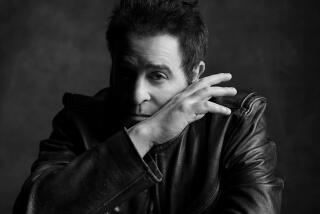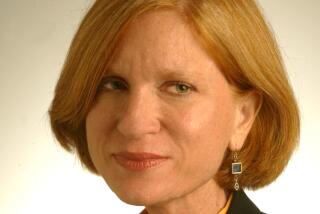Viscott Shared a Vision of Strength
David Viscott has died before. Twice before, actually. But he came back because he had much more to do. He told me this 10 years ago when I sat with him for four hours in his lovely Hancock Park home one chilly fall afternoon.
Iâd gone to Davidâs house to interview him for a cover profile Iâd been assigned to write for a radio industry magazine. I was armed with my recorder and one 90-minute tape cassette. I figured a man as busy as Viscott would grant me maybe 45 minutes. He wound up lending me additional tapes until he was finished talking.
Forget my prepared questions--I just let Viscott talk and rant through a riveting free association that resulted in a more complete portrait of the man than I could have ever achieved through questioning.
He wanted no less than to change the world. And he worked arduously on that as a mass therapist, which heâd come to call himself. He reached millions through his radio shows on KABC-AM (790), KIEV-AM (870) and KMPC-AM (710), books (12 published), a line of greeting cards, TV shows, the Viscott Institute counseling center, creativity seminars and chartered cruises on which he helped people work on the blocks in their lives.
By virtue of his gifts and uncommon ambition, he may have changed more lives than any other therapeutic person whoâs ever lived. And still he fell short of his vision.
âDavid had big dreams that eluded him,â said Bonnie Fleming, longtime friend and publicist for Viscott. âSo he suffered disappointment. I think he died of a broken heart.â
Thatâs why I, like others in the Southland, were so sorry to learn of his Oct. 14 death at his Studio City home. Sorry not just for the loss of such a talented, insightful man who had given so much to this region and indeed the world, but for the disquieting fact that he died alone. Heâd been separated from his wife, Katherine, whom heâd been with for nearly 20 years. A cleaning crew found him in bed. A pity for a man who touched millions.
And thatâs not the only unfortunate irony in this manâs complex life. âDavid had his own source of problems,â Fleming said. âI wish he could have taken more of his own advice and gotten help when he needed it.â
Yet the fact that he was alone in the end wasnât a surprise to those who knew him. Aside from the fact that he had a very public life, he was quiet and introverted. During my visit, he talked about several encounters with former schoolmates who crossed his path later in life. âThey all remembered me as a loner, as being completely removed. I never saw myself that way.â
Born in Boston in 1938, Viscott grew up in Newton, Mass., âwith an exceptional group of good-hearted, bright, privileged people who were a little sexually inhibited because of the time.â He continued the life of privilege through his schooling: Dartmouth, Tufts Medical School, medical internship at Barnes.
He knew from a very early age that his gift was his ear. It inclined him strongly to music, but his father wanted him to be a doctor. âAnd I was not sure enough of my gifts in other areas to do anything but.â
He remained passionate about music all his life and regretted not devoting more of his life to that love, though thatâs not what he would have advised others.
âHe had a love for music that truly overwhelmed him,â Fleming said. âMusic was his friend. My picture of David is driving around with classical music blaring.â As he would have wanted, any money given in his memory will go to Juilliard School.
He moved to California in 1979, the same year he did his first radio show, because âit smelled rightâ and he was caught up with the magic of show biz. One of the ideas he toyed with for a radio show was this: âWhat if I set myself up like Mork. Iâve been assigned this planet because itâs rather insignificant and Iâm still earning my wings. Iâm here to help solve the great problems of Earth: better distribute justice and food, create a unified government, make it safe from nuclear weapons, clean up disease, fix the ecology, and here I am doing my best.â Here he paused, then digressed.
âSee, Iâm not of this world, but Iâm very much of this world,â he continued. âMost of all I want to do what I came here to do, to make people feel stronger in their lives so that everyoneâs life can be the source of strength and nurturing, and gradually the world becomes better. Then I can die in peace.â
He referred to death often, possibly because his hold on life was tenuous. Twice, he said, his heart stopped and he was taken for dead. The heart problems stemmed from a condition he was born with called situs inversus totalis, in which all the organs of the body are on the wrong sides.
One of the resulting defects, he explained, was that, under physical stress, his heart rate could skyrocket and send him into cardiac failure. This apparently happened once during a game of Ping-Pong when he was a medical intern and again on a golf course in 1964.
âBehind me, while I was floating up,â he said, âwas a great light inviting me if I wished it. So I turned around and came back down. I had a lot more to do.â
His charter, as he declared to me, was to âraise the consciousness of as many people as I can for very selfish reasons. I donât want to get blown up. Iâm not afraid of dying, but you know something? This is the only game around for such a distance in the universe I canât even begin to tell you. You know when the next bus is coming to take us to the next place? You could die waiting. Everyone is sitting around waiting for Godot. Heâs not coming.â
I donât know where that bus has taken you, David, but I do know this. Youâre not finished yet.


